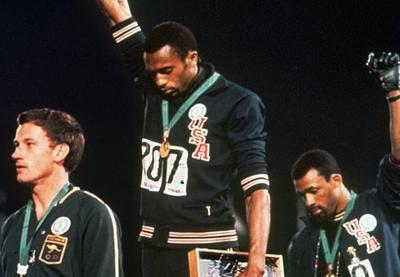The International Olympic Committee (IOC) has announced that it will be regulating—and possibly punishing—expressions of protest at the 2020 Tokyo Olympic games. This decision comes in part as a response to events last fall at the Pan-American Games, where athletes Race Imboden and Gwen Berry protested during their medal ceremonies by kneeling and raising a fist, respectively. But the tradition of Olympic protest dates back more than a century and most famously manifested at the 1968 Mexico City Olympics when Tommie Smith and John Carlos raised their fists to protest injustice.
Reading about this announcement with students and discussing the motivations and implications of possible choices by the IOC and by athletes at this summer’s games present an opportunity to practice close reading and analytical skills while also opening valuable conversations about power, voice and protest.
Here’s how you might start:
1. Check Students’ Previous Knowledge
Ask if students are familiar with the #TakeAKnee protests. If you do need to provide some context, the TT article “Discussing #TakeAKnee in Class” provides a useful overview of the reasoning behind the protest.
2. Read Together
Have students read the CBS News article “International Olympic Committee bans political protest by athletes at 2020 games.” (Hold the accompanying video for later in the discussion.)
3. Clarify Student Understanding
Ask students to work individually, in pairs or as a group to answer a few text-dependent questions. For example:
- According to the article, what specific forms of protest have been banned?
- According to the article, who has made this decision? What is the reason they gave for banning protest?
- According to the article, what is one recent example of athletes protesting? What consequence(s) did those athletes face?
- According to the article, what is one older example of athletes protesting? What consequence(s) did those athletes face?
- According to the article, if athletes do choose to protest during medal ceremonies at this summer’s Olympics, what punishment has the IOC decided on?
4. Share Necessary Background
Provide additional context for students to connect the announcement to previous athletic protests. You might try:
- Showing the short video “Tommie Smith reflects on iconic Olympic moment”
- Sharing this quote from an article about Gwen Berry: “‘At the last part—land of the free and home of the brave—something just came over me,’ she said. ‘It made me want to say, like, OK, this is a great country, this is a great land, but as Americans, are we really standing for what the anthem says? And I don’t think right now we are. ... As a human being, you have a lot of power, and you don’t really know it until you do something that creates something, and they say, Oh, wow, I do have a lot of power. My voice does matter.’”
- Talking with students about the long history of athletes protesting injustice.
5. Talk Together
Facilitate a discussion with students about the announcement from the IOC. You might begin with the following questions:
- The IOC announcement has made a lot of news recently. Is this something we should care about? Why or why not?
- The announcement explains that this new policy exists because “the focus at the Olympic Games must remain on athletes’ performances, sport and the international unity and harmony that the Olympic Movement seeks to advance.” How do protests work to disturb “unity and harmony”? How do they work to build it?
- The announcement details when and where athletes are allowed to protest at the Olympics. Do you think there are right or wrong places to protest? Why?
- Who should get to decide when and where people protest? Why?
- The IOC, which made this decision, is a committee of 115 people. Most of them are not active athletes. Do you think they were the right ones to make the decision? Why or why not? What steps could they take to make this decision in a way that is fair and ensures all perspectives are heard?
- Do you think any athletes will choose to protest at the summer Olympics this year? Why might they choose to do so? Why might they choose not to?
- The history of athletic protest has shown us that athletes often pay a steep price for choosing to highlight injustice. Why do you think that protests continue? How could people without a (literal) platform work to address these injustices?
